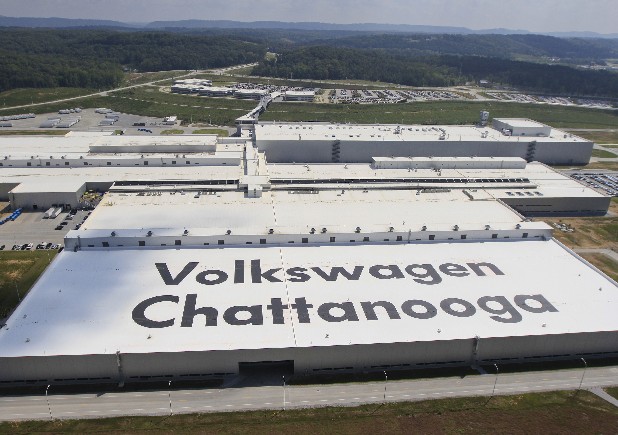How often is it that a company comes to your town, builds a $1 billion state-of-the-art facility, hires 2,700 people, provides a market for support businesses that employ another 1,300, and spins a payroll and purchasing net that generates more than $50 million in state and local tax revenue every year?
And how often is it that the same company - following a business model that works well for it at 61 other plants around the world - insists that its workers be partners in determining business practices.
And how often does any company invite a union participation to help create that partnership and make its business better?
Volkswagen is that one single company. It has invested in Chattanooga. It already is responsible for creating at least 4,000 new jobs here. And it churns $50 million a year in tax revenues into our community and the state.
VW wants a formal, legal way to have a works council - a labor board that talks with management about issues such as work hours, training and safety.
How refreshing. In this new Gilded Age in America, when 1 percent of Americans are reaping in 20 percent of all the country's income and when Fortune 500 CEOs make 204 times what regular workers average, Volkswagen wants a works council. Here, we call it a union. Volkswagen knows that team building and working together (their word is "co-determination") is better than repression (the South's expression would be "squeezing blood from a turnip").
It's all spelled out in the 130 words on the union cards that a majority of VW workers already have signed, according to United Auto Workers representatives.
"We the employees of Volkswagen are joining together to create the most successful Volkswagen Chattanooga facility possible. We recognize that our job security and our success as employees are bound up with the success of our company. We commend and embrace the Volkswagen philosophy of co-determination and aim to contribute to the production of the highest quality products, safe and efficient production methods, and the overall profitability of Volkswagen.
"We believe that the best way to actively participate in our company and to contribute to VW's continued success is to achieve representation as our colleagues have at the other 61 Volkswagen facilities across the globe. We choose to be represented by the UAW because, by working together, we can make the Passat the #1 car in the United States."
But for all the good things Volkswagen has brought to Tennessee and Chattanooga, entrenched powers here are acting as though they've just just been blasted off Lookout Mountain's gilded brow. Gov. Bill Haslam, Sen. Bob Corker, R-Tenn., and Chattanooga Area Chamber of Commerce Chief Executive Ron Harr all have implored VW to leave the union standing outside the door.
Woe is us, our leaders say. If you bring that union in, we'll lose other prospective employers. Really? Will firefighters and police officers and teachers and postal workers and UPS and airplane pilots and truck drivers all leave Chattanooga? Or if UAW arrives will those prospective auto suppliers refuse to sell any parts to any of VW's other 61 auto plants worldwide? Or to any other automakers elsewhere in the world that have unions? Will they not ship their goods in the trucks and planes operated by union workers? Will Tennesseans not buy cars?
There are 14.4 million U.S. workers who belong to unions, and another 1.6 million people work in jobs covered by union contracts. More than half of all union members work for city, county, state and the federal governments.
Nationally, union membership has been on the decline, but not in Tennessee, according to the U.S. Bureau of Labor Statistics. Here, it's growing. Of the Volunteer State's 2.5 million workers, 4.6 percent were in unions in 2011 and 4.8 percent - about 124,000 - were union members in 2012. Another 28,000 worked in jobs covered by union contracts.
And, yes, in 2012, among full-time wage and salary workers, union members made more money: Union members had median weekly earnings of $943, while those who were not union members had median weekly earnings of $742.
So how is it that Gov. Haslam and Sen. Corker and Mr. Harr think unions are bad for Tennessee?
Guys it can't be that hard to retool your "right-to-work" talking points. Take a VW "co-determination" lesson. Try something like: "We're a right-to-work state that knows how to work together with unions and work councils."

